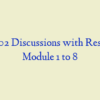Description
PSY 802 Module 2 Assignment: Annotated Bibliography and Outline – The Unconscious Mind and Self-Development
Synthesis is the process of creating a new idea by analyzing multiple disparate concepts or notions to discern the common thematic or connecting principles among them. Synthesis of research is a process learned through time and practice. In this assignment, you will engage in the first parts of the synthesis process: annotating and outlining. General Requirements: Use the following information to ensure the successful completion of the assignment:
Review the journal articles assigned in the first two modules of this course. This assignment uses a rubric.
Directions:
- Provide an annotated bibliography (750-1,000 words total) of the assigned journal articles for the first two modules of this course. Include the following for each article:
- The article citation and persistent link. These are provided above for you to paste into the assignment and are not included in the total word count. Be sure to verify the accuracy of the reference formatting as these can change during the insertion process. A written summary of the key concept(s) of the article. Why was the study done? What was the population studied? What did the researcher(s) conclude? What other information about this study do you believe is unique or important to recall? Are there specific statements made by the author that you wish to retain?
- Construct an outline for a paper that will explain and synthesize the articles you read for this assignment with those you will read in Modules 3 and 4. The paper will require identification of themes common to the articles as well as a statement of the conclusions that can be drawn when the articles are taken together as a single entity. You will be writing the paper in the next assignment.
PSY 802 Module 4 Assignment: Synthesis Paper; The Unconscious Mind and Self-Development
Synthesis Paper – The Unconscious Mind and Self-Development Synthesis is the act of creating something new from multiple existing entities. Synthesis of research, then, is creating a new idea from existing ideas. It is a process developed through time and practice.
In this assignment, you will apply the synthesis process to the journal readings from the first four modules of this course. As you synthesize, remember that Freud and the Psychodynamic and Psychoanalytic theory suggest that early stages of human development have a significant impact on our relationships and our Ego throughout the life span. This leads to the notion that manifested behavior is based on latent problems of the past.
General Requirements:
Use the following information to ensure successful completion of the assignment:
- Refer to the annotated bibliography and outline you created in the Module 2 assignment along with the assignment feedback from your instructor.
- Review the journal readings from the first four modules of this course. You may wish to create annotations for the readings from Modules 3 and 4 for use in the synthesis process.
Directions:
Locate the annotated bibliography and outline you created in the Module 2 assignment. Using the outline you developed, the information from the annotated bibliography, and the feedback provided by your instructor, write a paper (2,000-2,250 words) that synthesizes all of the articles assigned in the first four modules of this course. Do that by including the following:
- A statement of common themes addressed in each of the articles.
- A statement of the conclusions that can be drawn when the articles are taken together as a single entity. What is the overall message of the group of articles? Focus specifically on the key developmental terms, processes and challenges that individuals may face up through adulthood. Why are the unconscious mind, dreams, and ego defense mechanisms important to understand from the Psychoanalytic perspective? Be sure to address the notion that Freud and the Psychodynamic and Psychoanalytic theory suggest that early stages of human development have a significant impact on our relationships and our Ego throughout the life span.
PSY 802 Module 5 Assignment: Annotated Bibliography and Outline – Neo-Freudianism
Synthesis is the process of creating a new idea by analyzing multiple disparate concepts or notions to discern the common thematic or connecting principles among them. Synthesis of research is a process learned through time and practice. In this assignment, you will engage in the first parts of the synthesis process: annotating and outlining.
Directions:
- Provide an annotated bibliography (750-1,000 words total) of the assigned journal articles for Modules 5 and 6. Including the following for each article:
- The article citation and persistent link. These are provided above for you to paste into the assignment and are not included in the total word count. Be sure to verify the accuracy of the reference formatting as these can change during the insertion process. A written summary of the key concept(s) of the article. Why was the study done? What was the population studied? What did the researcher(s) conclude? What other information about this study do you believe is unique or important to recall? Are there specific statements made by the author that you wish to retain?
- Construct an outline for a paper that will explain and synthesize the articles you read for this assignment with those you will read in Module 7. The paper will require identification of themes common to the articles as well as a statement of the conclusions that can be drawn when the articles are taken together as a single entity You will be writing the paper in the next assignment.
PSY 802 Module 7 Assignment: Synthesis Paper – Neo-Freudianism
Synthesis is the act of creating something new from multiple existing entities. Synthesis of research, then, is creating a new idea from existing ideas. It is a process developed through time and practice. In this assignment, you will apply the synthesis process to the journal readings from modules 5-7. Keep in mind that Several of Freud’s early colleagues and supporters splintered away from his model for different reasons.
Directions:
Locate the annotated bibliography and outline you created in the Module 6 assignment. Using the outline you developed, the information from the annotated bibliography, and the feedback provided by your instructor, write a paper (2,000-2,250 words) that synthesizes all of the articles assigned in the Modules 5-7 of this course. Do that by including the following:
- A statement of common themes addressed in each of the articles.
- A statement of the conclusions that can be drawn when the articles are taken together as a single entity. What is the overall message of the group of articles? Focus specifically on the key aspects of Freudian thought which caused these other theorists to distance themselves from Freud’s views and influence. Consider also the major differences among themselves which caused them to diverge from one another.
PSY 802 Module 8 Assignment: Literature Review Resources
Successful completion of a doctoral dissertation requires significant amounts of independent reading on the research topic. This allows the doctoral learner/researcher to become familiar with the scope of the topic and to identify gaps or tensions within the existing literature on the topic. These gaps and tensions become the source of the dissertation research.
In this assignment, you will read and annotate potential sources in your dissertation field of interest. Those demonstrating the most merit to the best of your understanding of the topic at this time should be added to your RefWorks list for potential inclusion in the literature review section of your dissertation.
Directions:
- Read at least 10 empirical articles in your general dissertation field that you have not read previously.
- In the “Literature Review Resources” document that you submitted in PSY-801, provide the following for each source that you are adding to the document:


